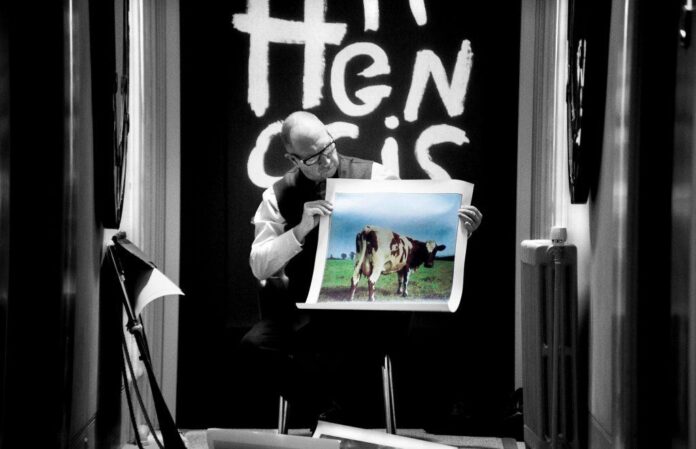Releasing a documentary about album art in the age of streaming, when the 12-by-12-inch sleeve has given way to the digital thumbnail, seems almost quaint. But not for director Anton Corbijn. His latest film is making the case that these physical album covers possess an appeal that outlasts and even defies time—especially ones as lavishly designed as those by Hipgnosis.
Squaring the Circle presents a portrait of the legendary British design collective, founded in 1968 by Cambridge boys Storm Thorgerson and Aubrey “Po” Powell, which was behind some of the most iconic and innovative album covers of our time. The psychedelically tinted sleeve of Led Zeppelin’s Houses of the Holy, the prismatic rainbow on Pink Floyd’s Dark Side of the Moon, the dynamic composition of Wings’ Band on the Run—these and heaps more emerged from Hipgnosis’s shambolic studio over the span of 15 years.

Pink Floyd, (1973). Artwork by Hipgnosis. Photo courtesy of Hipgnosis Ltd.
“Out of chaos can come really beautiful things,” Corbijn told Artnet News. “If you have a good idea, you can’t fail. Good ideas are where it all starts. Some of the record sleeves are very much of their time, but some really stand the test of time.”
It’s a logical outing for Corbjin, who, besides being U2 and Depeche Mode’s long-time go-to photographer, helmed 2007’s Control, a fine biopic on Joy Division’s frontman Ian Curtis. But according to the director, he was reluctant to be pigeonholed as the guy who makes films about music. Still, he was ultimately swayed by Powell, who pitched the project to him: “He’s a salesman, really,” Corbijn said.

The Hipgnosis group [from left]: Peter Christopherson, Aubrey Powell, and Storm Thorgerson. Photo: © Hipgnosis Ltd.
And Po, too, serves as a lively guide through Squaring the Circle. With startling detail, he recalls his friendship with Thorgerson, Hipgnosis’s work with the musicians of its day (most prominently, Pink Floyd), and the company’s shuttering in 1983. It’s a tale told mostly through archival footage and talking heads, among whom are names like Roger Waters, Jimmy Page, Paul McCartney, and Noel Gallagher. More compelling, though, are the stories and ideas behind Hipgnosis’s most striking sleeves.
Why did an image of a cow end up on the packaging of Pink Floyd’s Atom Heart Mother (1970)? Well, Thorgerson just thought of creating a cover that was “completely meaningless,” drove out of London, and snapped a photograph of the first cow he saw. How did Hipgnosis stage and enhance each water droplet on the sleeve of Peter Gabriel’s 1977 album? With a hose, then hand-coloring, then a scalpel.

Led Zeppelin, (1973). Artwork by Hipgnosis. Artwork by Hipgnosis. Photo courtesy of Hipgnosis Ltd.
Centered in an age before Photoshop (or A.I. generators, for that matter), the documentary highlights the studio’s predominant use of photography, as well as the analogue—and audacious—lengths it would go to for a record’s artwork.
For the cover of 10cc’s Look Hear? (1980), which featured a visual of a sheep on a psychiatrist’s couch positioned on a beach, Hipgnosis headed to Hawaii to photograph an actual sheep on a psychiatrist’s couch on a beach. For Wings’s 1978 greatest hits compilation, fronted by an image of a Demétre Chiparus statue against a snowy backdrop, the sculpture was flown to Everest and photographed from a helicopter. For the inner sleeve of Pink Floyd’s Wish You Were Here (1975), depicting a man on fire, the group, well, set a man on fire.

The sheep. Photo: Aubrey Powell, © Hipgnosis Ltd.
The elaborate efforts and resources poured into these productions speak to an industry heyday in the 1960s–70s when bands dominated stadiums, owned private jets, and still had money to spare for a deeply conceptualized album cover. It was a moment that, also documented in Squaring the Circle, would be swept away by the advent of punk and its scrappy, DIY aesthetic. And as Gallagher laments in the film, streaming has further reduced the record cover to a few tight pixels on a Spotify playlist.
The documentary seems an elegy of sorts for a fading art form. But for Corbijn, he’s hoping it might open for a young audience “a new world,” particularly in the wake of a vinyl revival. If nothing else, Squaring the Circle remains a reminder of a medium that, in Gallagher’s words, allows a poor man to amass an art collection.
“Great album sleeves will always be great album sleeves,” said Corbijn. “I don’t know if it’s art in the end. I don’t know and maybe I don’t care either.”
Squaring the Circle is screening at Film Forum through June 15.
More Trending Stories:
Is Time Travel Real? Here Are 6 Tantalizing Pieces of Evidence From Art History

























